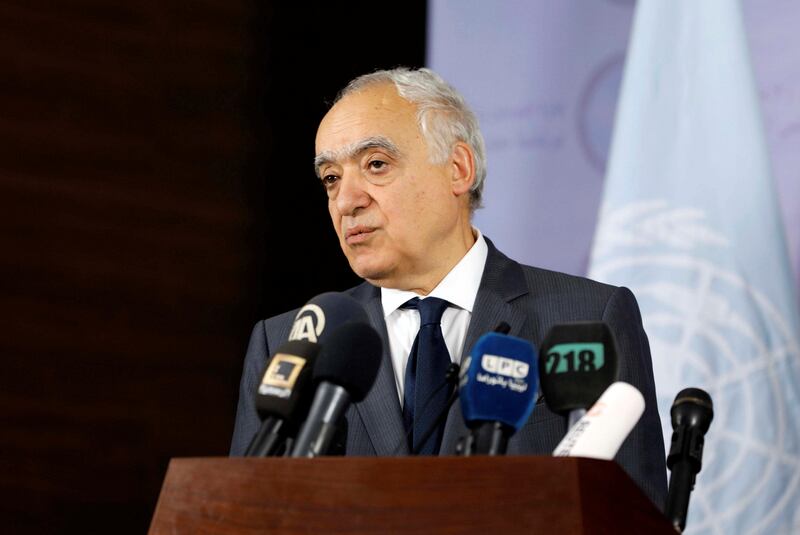Libyans were asked to “seize the opportunity” for national unity after the UN's envoy presented a roadmap to presidential and parliamentary elections under a new constitution.
Ghassan Salame, the UN special representative, unveiled a phased plan to Libyan and international leaders yesterday, that rests on major political players uniting behind a drive to hold elections as soon as next year.
“The action plan was not designed by me but by the Libyans. They want an inclusive process, a way forward which clearly defines stages and objectives,” Mr Salame told the New York meeting. "We are at a juncture now. Either we work together and give Libya its best chance, or work apart and rob Libyans of their chance.”
Under his proposal a drafting committee charged with drawing up a new political system would meet in Tunis next week. This would then establish a national political conference under the auspices of the UN Secretary General that “opens the door to the “self-marginalised”.
By bringing in those groups that boycotted the political process, Mr Salame hopes to straddle the divide between the competing factions in east and west Libya, as well provide a platform for inclusion of powerful figures like Field Marshal Khalifa Haftar, the Benghazi-based commander of the national army.
______________
Read more
[ Macron and May to warn Facebook, Google and Twitter over radicalisation ]
[ Erdogan to discuss 'sanctions' against Iraq's Kurdish region ]
[ Rouhani hits back after Trump says fate of Iran nuclear deal 'decided' ]
______________
The Libyan Political Agreement (LPA), the 2015 deal that stalled, would remain as the framework for the new push to resolve differences.
The announcement drew support of Fayez Serraj, the head of the UN-backed government of national accord, who urged all sides to sign up before the LPA expires on December 17. “We must not return to year zero,” he said.
Theresa May, the British prime minister, led reaction to the announcement, warning that there must be no competing initiatives or playing for time by the factions that have squabbled ever since the overthrow of Muammar Qaddafi in 2011. “Political agreement should remain the legal framework during this transitional phase,” she said. “Leaders must put their hands together for the sake of peace and stability.”
The key point of the Salame plan requires a collegiate approach in which the existing institutions and the new constitutional assembly works together to form an executive by consensus.
“There is no military solution,” said Antonio Guterres, the UN secretary general. “Violence has only dimmed hopes for peace, undermined institutions, damaged Libya’s vast economic potential and exported instability to the region. Looking ahead, it is crucial to fashion a Libyan-led and Libyan-owned political solution.”
One political analyst warned that divisions within the groups made the task of the UN envoy even more difficult. “We have to admit that Libya has reached a very advanced level of political deadlock that requires a solution and not more escalation,” said Faraj Dardour, a Tripoli political analyst. “Even elections need an agreement to support their results.”
A second challenge to Mr Salame is how to bring armed groups under the umbrella of the national army. "The Libyan national army will have an initiative to be unified and the local reconciliation efforts must be intensified to reach the whole country."






